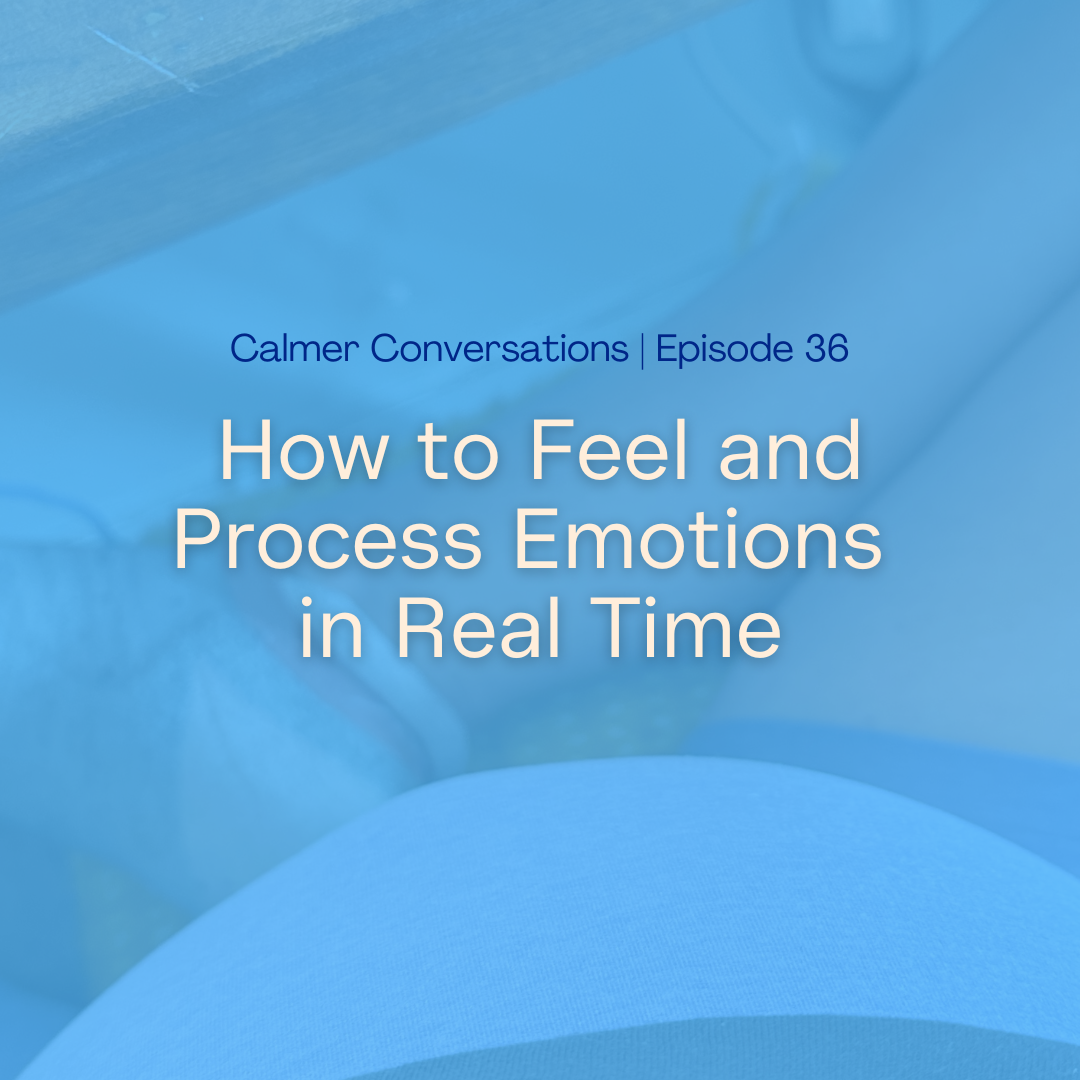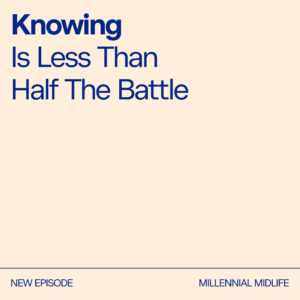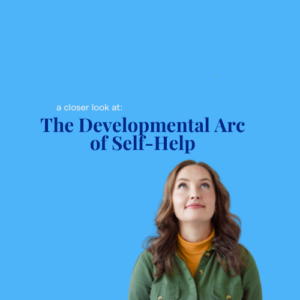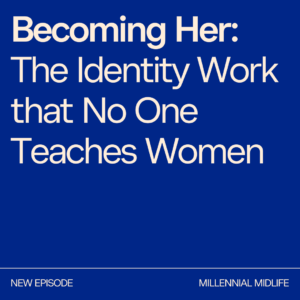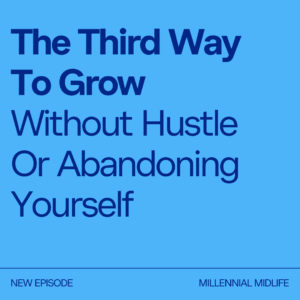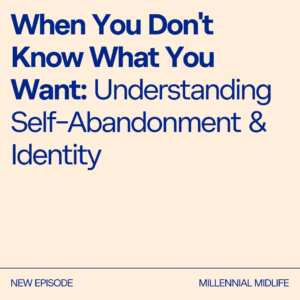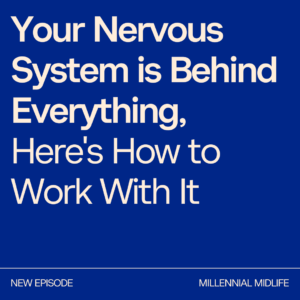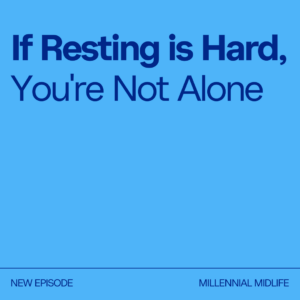Cecelia Baum Mandryk (00:01.144)
Hey and welcome to Calmer Conversations. I’m Cecilia, your host. I think we’re on episode 36, but I am notoriously bad at keeping track of those things. Welcome back if you’re a repeat listener. Welcome for the first time if you’re new here. If you haven’t said hi over on Instagram or send me an email, please do that. Let me know that you listen. Let me know what you like. Let me know what you want more of on the podcast so that I can give you more of what you’re looking for. Okay.
So today I want to talk about the process of feeling an emotion in real time and why it’s important to feel an emotion in real time. This sounds like generally not fun work, I’ll be honest. And most of us don’t even really know what processing an emotion is. Before I started doing this work, I thought processing an emotion involved talking with people about it or repressing it. So pushing it away or kind of acting out from it, which for me,
in the past meant like having a drink or going for a run or maybe being mean to somebody that I loved. So if that sounds like you, if you’re somebody who has emotions and you’re not sure what to do with them, or maybe you struggle with certain emotions like maybe anxiety or anger or frustration or overwhelm, then this is for you. And honestly, if you’re just a human and you want to know more about emotions, this is also for you. Okay, I often say that when people
start working with me, one of the skills that they will get is they will be able to feel hard emotions. They’ll be able to sit with hard emotions. And that generally doesn’t sound very enticing to people. And most of the time people don’t think like, most people when they’re going through like self-development or like, I need to learn how to feel hard emotions. That would be really helpful. I don’t think it ever really comes up. It’s not something that’s talked about, but for so many of us, feeling emotions is something that we struggle with. And it’s something that I…
I work with clients with over and over again. So I’ve talked about this before on the podcast. This isn’t new. Most of these topics are just kind of different flavors of a very similar theme, right? And so I’m gonna say whatever I say today in a different way than what I’ve said it before, even if there’s some overlap.
Cecelia Baum Mandryk (02:14.53)
But feeling an emotion, so even if you’ve heard something like this, I would encourage you to stick around. And even if you don’t think that you need to learn how to feel emotions, I would encourage you to stick around because most of us don’t think that we need to feel them. But most of us were raised by humans. We were raised in the society we were raised in. And most other humans have ideas about emotions. And most societies have ideas about emotions and how people are supposed to feel them or what emotions it’s okay to feel or how it’s okay to express emotions.
whether or not somebody told you these things explicitly, you absorb them from being in whatever culture you grew up in, whatever religion, whatever time period with your parents in your specific place, whatever that was. So just know that that’s all in you. And that means that you have your own specific way of working with emotions. Likely, whatever you were taught was not to
recognize an emotion in the moment, to acknowledge an emotion in the moment, and to be with it. Most of us were taught to push emotions away, to repress them, to push them down, so to avoid them, right, pushing them away, to buffer from them, so an emotion comes up and we immediately try and feel good in some other way, whether that’s by exercising or cleaning our house so we can feel good, or by picking up our cell phone.
Getting on social media and give you like a little hit of dopamine or playing a game or eating some chips or eating some ice cream or chocolate or something like that That’s oftentimes what we were taught to do some of us were taught that you weren’t supposed to feel any emotions at all and As a result we’ve kind of conditioned ourselves to ignore emotions and we might then think that we are people who don’t really feel emotions However, emotions are part of the human experience and that’s the entire range of emotions right from
really, really positive emotions like joy and happiness and connection and love and gratitude to harder emotions, right? Like grief or sadness or fear or anger. And we have, so those are all part of our human experience. And because based on who you are, you’re the gender you were raised as the society that you were raised in, you have different thoughts about emotions and how you’re supposed to process them. And like I said, for most of us, this isn’t
Cecelia Baum Mandryk (04:38.146)
we weren’t taught to process them as we can process them. I have a mini course on this called the five minute shift, which takes five, it’s kind of teaching you how to do this work in real time. And the idea is that within the first five minutes, a feeling and emotion, you can shift from it into something else, but that you can start to do that really quickly. So in about 60 to 90 seconds, you can start to shift an emotion. I’m not gonna give you the entire course here. You can get it. I’ll provide a link for it. Maybe I’ll even put it on sale for a little bit.
but you, and it’s only $29. So it’s like, it’s an amazing way to start doing this work. But the whole point of this course and the whole point of this podcast episode is to point out that any emotion that hangs around for more than 60 to 90 seconds, you haven’t processed it. I’m gonna say that again, because I think that’s the whole reason why I’m recording this. Any emotion that hangs around for more than 60 to 90 seconds.
you haven’t actually processed it. And oftentimes the experience you’re having of it, if that is the case, is your experience, your resistance to it. So this came up in coaching recently in a group and somebody noticed they were about to have surgery and they noticed that they were feeling panic. Now they were able to recognize this because they’ve been doing this work, but they noticed that previously what they would have done is they would have felt the panic then, and they were able to describe this again because
because they’ve been doing this work.
Cecelia Baum Mandryk (06:49.506)
Okay, so what she was able to tell me that in the moment, as she was waiting to have surgery, she recognized she felt panic. And she also recognized that previously what she would have done is she would have judged herself for feeling panic. So she would have felt the panic, then she would have said, who are you to feel panic? This is ridiculous, you shouldn’t be feeling panic. Get over yourself, whatever would actually go through her brain. So she recognized that this pattern.
used to be there. And then what she said is that she would have stayed in the panic and in the shame around the panic for anywhere from maybe 10 minutes to hours to however long perhaps in this case the surgery started right and that’s where she would have been. She would have been in this tight spirally place around panic and shame and feeling like she shouldn’t be feeling what she was feeling. In this moment what she said what happened was she recognized she had panic
she could logically meet herself, she could acknowledge the panic. I’m feeling panic right now. Panic feels like this in my body. And in this moment, I can logically understand that other people might also feel panic. It’s a very human thing to feel panic before having surgery. I’m not the only person. And in that moment, what she did was she accepted her emotion and she processed her emotion so that her emotion didn’t hijack her brain.
And this is like the entire point of this short episode is that when you start to feel and process your emotions, they don’t hijack your brain and they don’t hijack your day and they don’t hijack your week or your month or your year. What you start to do is you start to notice the emotion that’s coming up in the moment. You say, I’m feeling anger. I’m feeling fear. And this happened to me. I actually did it earlier today around something. I felt fear and I felt this old story. I felt this really, I felt so small and I felt so panicked like I was going to get in trouble.
And in that moment, I actually said it out loud because I was alone, but even if you’re around people, you could name it. And I said, I’m afraid right now. I’m really scared. I’m afraid I’m going to get in trouble. And it was like this, I’m going to be called to the principal’s office kind of type feeling in my body. And it was like, it was racy and it was small and it was panic. And I named it kind of like my client did. And said, this is what I’m feeling. And instead of that feeling, taking over my entire morning, which it would have done it like maybe a couple of years ago, or my entire day.
Cecelia Baum Mandryk (09:02.242)
which even a few years before that, that’s what I would have done. Or even an entire week where I would have been in this spiral, a feeling like I was in trouble and naming all the things that I had done wrong. I was able to recognize, this is where I am right now. I’m feeling panic in this moment. This is a normal thing to feel based on what had happened. I’m a human. I’m telling myself a story. And I’m not trying to blame or bypass myself when I say that. I’m trying to explain what’s happening to my brain. And I’m safe in this moment.
So when you learn how to process emotions, this is mainly what I’m talking about. Actually, this isn’t even the processing part. Like this is the noticing part, right? This is like becoming aware of your emotions. And the more you can become aware of your emotions and name them in the moment, the easier time you will have being able to move on from them. And like I said, I have this course, the idea, it’s a very short course, it’s $29. The idea is that you go in there and you gain this skill of learning how to identify and process emotions.
so that the emotions don’t take over your brain for the rest of the day. Because how many of you, something happens, you maybe skip the gym in the morning and then you’re in a shame spiral the entire day about not going to the gym and you’re telling yourself you’re a bad person and then all the food you eat and everything you do is clouded with the fact that you’re a quote unquote bad person because you skipped the gym, because you’re in the shame space. The alternative is, and this episode and the work that I do in this short course is to recognize, okay,
I, this did happen. I did skip the gym and right now I’m feeling shame, but I don’t have to let that shame take over my entire day. In fact, I’m responsible for what I feel and what I see in my life. When I take that responsibility and I notice what’s happening, then I can shift and change it. Okay, a short episode, but this is the power of naming your emotions. It’s the power of noticing your emotions and claiming them to yourself out loud. I hope this is helpful. Really, truly. I’ll have the link for the five minute shift.
A lot of my clients have it and use it all the time. A lot of random people from the internet have it and love it. If you are somebody who wants to learn how to name emotions and get out of the spiral quicker, I highly suggest you grab this course and tell me how it goes. Tell me what emotions you’re able to process, how quickly you’re able to get out of it so that you can notice how you’re not staying in the space over and over again. All right, I will see you next episode.
Cecelia Baum Mandryk (11:21.89)
Thank you so much for being here. Like I said, come say hi on social media. Let me know if you’re listening and what you want to hear more of, and I will see you next time. Bye.

